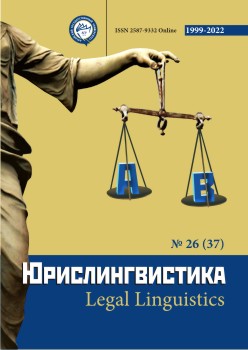Virtual World and Social Reality: Correlation Aspects
УДК 340 ББК 67.0
Abstract
The article examines the issues of correlation between the essential characteristics of the virtual world and social reality; the concepts of the plurality of worlds are analyzed from the point of view of sociology, psychology and legal law enforcement practice; the main approaches to understanding virtual reality are studied. At the end of the article the authors propose to consider the ontological status of the virtual world as part of human existence, highlighting the essential features of virtual reality. The authors come to the conclusion that the concept of a close connection of all worlds makes it possible to observe the transfer of socially and legally significant phenomena from the real world to the computer world and vice versa.
Downloads
Metrics
References
Bogost I., Ferrari S., Schweizer B. Gry informacyjne: dziennikarstwo epoki cyfrowej. Kraków, 2012.
Keane D. Philosopher David Chalmers on consciousness, the hard problem and the nature of reality / ABC News (Australia). – 2017.
Raessens J. Playful Identities, or the Ludification of Culture / Games and Culture. – 2006. – Vol. 1 (1). – Pp. 52–57.
Boyd S.G., Pyne B., Kane S.F. Video Game Law: Everything you need to know about Legal and Business Issues in the Game Industry, 2019.
Voiskounsky A.E. On the Psychology of Computer Gaming / Психология. Журнал Высшей школы экономики. – 2015. – Т. 12. № 1. – С. 5–12.
Архипов В.В. Виртуальное право: основные проблемы нового направления юридических исследований / Правоведение. – 2013. – № 2 (307). – С. 93–114.
Буглак С.С., Латыпова А.Р., Ленкевич А.С., Очеретяный К.А., Скоморох М.М. Образ Другого в компьютерных играх / Вестник СПбГУ. Философия и конфликтология. – 2017. – Т. 33. Вып. 2. – С. 242–253.
Вахштайн В. Восприятие реальности: «правила Макнотена» и «Вторая жизнь». URL: https://polit.ru/article/2013/01/28/ps_vakh_detective/ (дата обращения: 19.08.2022)
Витгенштейн Л. Философские работы. Ч.1. М., 1994.
Гофман И. Анализ фреймов: эссе об организации повседневного опыта: Пер. с англ. / Под ред. Г. С. Батыгина и Л. А. Козловой. М., 2003.
Гуревич П.С. Философия человека. Ч. 2. М., 2001.
Шевцов К.П. Компьютерные игры как предмет философского анализа / Вестник СПбГУ. – 2016. – Сер. 17. Вып. 1.
Шютц А. Смысловая структура повседневного мира: очерки по феноменологической социологии / Сост. А. Я. Алхасов; Пер. с англ. А. Я. Алхасова, Н. Я. Мазлумяновой; Научн. ред. перевода Г. С. Батыгин, М., 2003.
Copyright (c) 2022 Антон Васильев, Владислав Архипов, Николай Андреев , Юлия Печатнова

This work is licensed under a Creative Commons Attribution 4.0 International License.
The authors, which are published in this journal, agree to the following conditions:
1. Authors retain the copyright to the work and transfer to the journal the right of the first publication along with the work, at the same time licensing it under the terms of the Creative Commons Attribution License, which allows others to distribute this work with the obligatory indication of the authorship of this work and a link to the original publication in this journal .
2. The authors retain the right to enter into separate, additional contractual agreements for the non-exclusive distribution of the version of the work published by this journal (for example, to place it in the university depository or to publish it in a book), with reference to the original publication in this journal.
3. Authors are allowed to post their work on the Internet (for example, in a university repository or on their personal website) before and during the review process of this journal, as this may lead to a productive discussion, as well as more links to this published work (See The Effect of Open Access).











